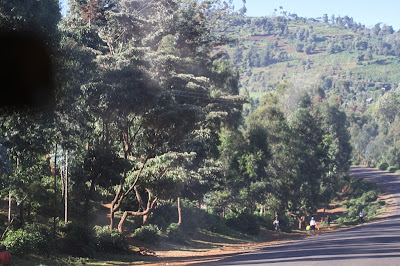This looks like a barely passable dirt track, but was in fact the main road for amost two hours. Peter said when it rains, it is truly impassable. If you get stuck, you just have to wait until someone can come and get you.
Several of the villages were very poor. It seems that in the Meru area the locals have become specialists in the supply of khat, a chewable and highly addictive leaf that is used to keep you awake when you are driving. It comes from the mora (sic) plant and you see locals grading and sorting and carrying it. Peter says it is not illegal, but is ruining the local culture.
An additional part of the local culture is that women and girls carry water and do laundry for the men. When they are young, they start working for their brothers. They carry water in 20 liter plastic jugs, secured to their foreheads with fabric and hanging off their backs and shoulders. If they have a lot of brothers, they can actually get dents in their foreheads from the constant pressure. If they marry well or live in a family that is more well off, they move to transporting the water by donkey. As in Egypt, donkey traffic mixes with cars and trucks as a matter of course.
Closer to Nanyuki, a large central city, there are larger farms for wheat and flowers--several owned by the same family. Mount Kenya sits above it all--very impressive, and a landmark the Kenyans are extremely proud of. Most days the peak is covered in clouds, but we got a nice view...lucky!
Much of the scenery is lovely.
We stopped in Nanyuki at a small mall with a bank and ATM. It had an iron fence around it and Peter said it was very safe...he took the time to check in with his fiance by cell phone. It turns out he was getting married 3 days later and explained how he had to pay a dowry of 3 cows and 4 goats, plus some cash to her family. Interesting customs...if they get divorced, she (i.e. her family) has to pay it back. This keeps divorce rates low.
It turns out the British Army does a lot of it's training for Afghanistan in the area around Nanyuki. That has pluses and minuses for the locals. On the one hand, the British soldiers and officers live in the area and spend money, and the army keeps the roads in somewhat passable shape. On the other hand, they use live ammo and every time there is a session (every few months, I guess), the wildlife have to contend with bombs and noise and such--and soldiers get killed by friendly fire. This bothers the locals.
We saw a lot of British heavy road equipment still cleaning up the roads from the November rains.
We've made it to Cairo...very smooth arrival with the help of our pal and wonderful trip coordinator, Emad. He has been a jewel and made sure that we got into our room at the Fairmont Towers early this morning, and also got an upgrade to a lovely business class room. This place is extremely elegant and even (to our surprise) has a casino, so we will be stopping in after a nap. We have until just after midnight, when we have to get over to the airport for the Cairo-Frankfurt and Frankfurt-Boston legs.










No comments:
Post a Comment